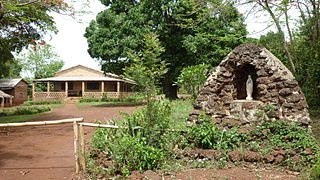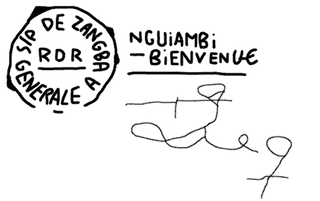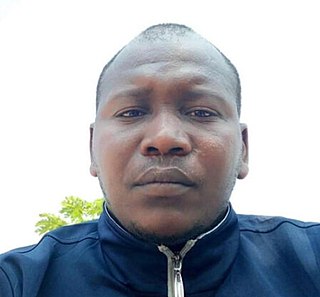Rosalie Nawira | |
|---|---|
 | |
| Mayor of Zemio | |
| Personal details | |
| Born | 1968 |
| Nationality | Central African Republic |
Rosalie Nawira (born 1968) is a Central African politician and a current mayor of Zemio.
Rosalie Nawira | |
|---|---|
 | |
| Mayor of Zemio | |
| Personal details | |
| Born | 1968 |
| Nationality | Central African Republic |
Rosalie Nawira (born 1968) is a Central African politician and a current mayor of Zemio.
Born in 1968, Nawira learned the trade from his father. Nawira lost her father at the age of 12. Four years later, she became orphaned when her mother died. Afterward, she started her career as a merchant. She traded many items, such as food, clothes, bicycle parts, and ivory. In 1999, an agricultural bazaar was held in Zemio, and she was tasked to manage the budgets for the event. [1]
In 2014, sectarian violence between Muslims and Christians broke up in Zemio. Responding to this horizontal conflict, Nawira tried to persuade the local police and UPDF to approach two warring parties. However, they refused to do it and instead asked her to meet the groups. She accepted it and convinced them to end the conflict. With her persuasion, both groups agreed to stop the conflict and even apologize for the tension they created. Nawira's success in easing the tension led her to be invited to Bangui to speak at National Transitional Council. [1]
Nawira created a group Femme Action Plus to empower women and support the LRA's returnees. She was appointed as the organization coordinator. [1]
Nawira imposed taxes on several things. For the displaced people who returned to the town and wanted to rebuild houses, she taxed them at 25,000 CFA Francs. Besides, she ordered the sellers of a Central African traditional drink, ngouli , and a person who braids hair at houses to pay tax at 10.000 CFA Francs. Imported cassavas from Congo are taxed at 1,000 CFA francs, while the person who distributed it has to pay 500 CFA francs. Anyone who wants to sell cassava in the town must pay a tax of 500 CFA Francs for each bowl. [2]
Nawira's tax policy was controversial since it burdened the town residents, who mostly lived in miserable conditions. The economic adviser of Haut-Mbomou Prefecture called her tax policies "unacceptable. [2]
On 3 July 2023, UPC members from Mboki visited Zemio and kidnapped Nawira. She was then released several hours later after the intervention from locals who asked the rebels to release the hostage. [3]

Obo is the capital of Haut-Mbomou, one of the 14 prefectures of the Central African Republic. It is close to the African Pole of Inaccessibility.

Baoro is a town located in the Central African Republic prefecture of Nana-Mambéré.

In international relations, Françafrique is France's sphere of influence over former French and Belgian colonies in sub-Saharan Africa. The term was derived from the expression France-Afrique, which was used by the first president of Ivory Coast, Félix Houphouët-Boigny, in 1955 to describe his country's close ties with France. It was later pejoratively renamed Françafrique by François-Xavier Verschave in 1998 to criticise the alleged corrupt and clandestine activities of various Franco-African political, economic and military networks, also defined as France's neocolonialism.
Bakouma is a sub-prefecture in the prefecture of Mbomou in Central African Republic. The area is known for its prosperity of mineral resources which have for a long time remained unexploited.

Zemio is a town and sub-prefecture in the Haut-Mbomou prefecture of the south-eastern Central African Republic. Zemio was the former capital of the Sultanate of Zemio before it was abolished in 1923 by France.

Catherine Samba-Panza is a Central African lawyer and politician who served as interim President of the Central African Republic from 2014 to 2016. She was the first woman to hold the post of head of state in that country, as well as the eighth woman in Africa to do so. Prior to becoming head of state, she was Mayor of Bangui from 2013 to 2014. She is a non-partisan politician.
Bambouti is a sub-prefecture of Haut-Mbomou in the Central African Republic.

Since 2013 around 15,000 Muslims had been besieged in PK5 district in Bangui, Central African Republic.

Mboki is a town and sub-prefecture in the Haut-Mbomou prefecture of the south-eastern Central African Republic.

Tiringoulou, also spelled Tirigoulou or Tiroungoulou, is a village in the Vakaga Prefecture in the northern Central African Republic.

Bienvenue Nguiambi – is an Anti-balaka commander from Yehou village in Basse-Kotto prefecture in the Central African Republic, responsible for multiple crimes against civilians including kidnappings for ransom and murder.
Sikkikede , also spelled Sikikédé and Sikikede, is a town in Vakaga Prefecture, Central African Republic. It is the largest settlement in Vakaga, with a population of around 20.000 people, and home to a rebel group, CPJP.

Mahamat Saleh Adoum Kette is a Central African warlord, general in the Popular Front for the Rebirth of Central African Republic (FPRC). He is responsible for multiple war crimes including murder, rape, forced marriage, torture and looting.
Dembia is a village located near the border of Mbomou and Haut-Mbomou Prefecture.
Kowone is a village located in Lim-Pendé Prefecture, Central African Republic.
The Wagner Group, also known as PMC Wagner, a Russian paramilitary organization also described as a private military company (PMC), a network of mercenaries, and a de facto unit of the Russian Ministry of Defence (MoD) or Russia's military intelligence agency, the GRU, has conducted operations in the Central African Republic since late 2018.
Mahamat Said Abdel Kani was a former general of FPRC and commander of Seleka who was arrested in 2021 for war crimes. He is the first Seleka commander to face charges at the ICC.
Koundé is a village located near Cameroon-Central African Republic border in Nana-Mambéré Prefecture.
Ouandago is a market town located in Nana-Grébizi Prefecture, Central African Republic.
Bohong is a town located in Ouham-Pendé Prefecture, Central African Republic.